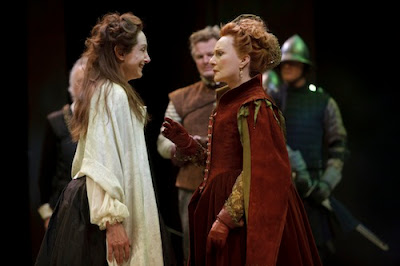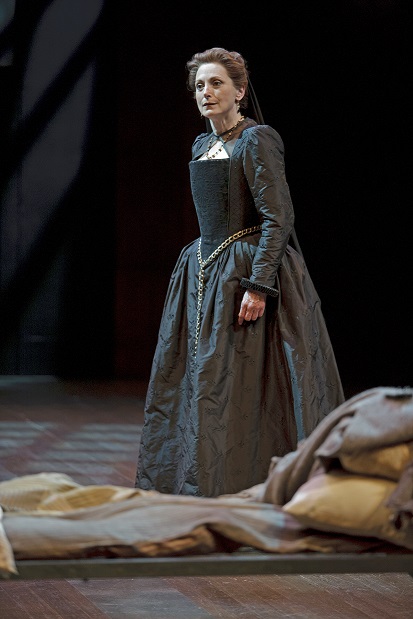

Friederich Schiller’s beautiful, poetic history play, Mary Stuart, is forever timely in its picture of the struggles between opposing forces, each representing conflicting religious beliefs, national entities and alliances, ruling ambitions, and, above all, feminine control. The play is set in 1587 at the time of Queen Elizabeth’s reign before the attack of the Spanish Armada and the execution of Mary, Queen of Scots. At that time, Elizabeth I was still accepting the pressure to marry and secure an heir without finally giving in to what we now think was her decision all along: to be the first great independent, unmarried female ruler in our history. Schiller wrote it in 1800 after the French Revolution but before Napoleon’s reign – also a time of world change.
Elizabeth kept Mary imprisoned for more than 18 years. The two queens never met, but Schiller could not resist the temptation to stage such a fascinating meeting. Both women were monarchs, considered beautiful, very intelligent and willful. Each was the chief figure of the national plots and dreams of countless religious, court, political, adventurous, military and noble leaders. And they were complete opposites who despised each other.
Predictably, great actresses have been attracted to the two roles, and two of Stratford’s finest lift this production to memorable distinction. Both have played most of Shakespeare’s leading female roles and many modern classics. Last year, Lucy Peacock played “Queen Lear,” switching the role to a female, and, in 2011, Seana McKenna played a male King Richard III. Peacock also starred in several major musical comedies, and both actresses have won awards in one-woman shows.
Stratford’s artistic director Antoni Cimolino has assembled a brilliant cast who give this production not only a very high polish indeed but also an unflagging fascination, even in the peripheral scenes involving minor characters, all played by major classical actors. James Blendick and Patricia Collins play Mary’s guardians and longtime attendants, whose kindly support affects our sympathy for the imprisoned queen.
Ian Lake plays Mortimer and Ben Carlson Lord Burleigh, Elizabeth’s courtiers whom she sent to intimidate Mary. Elizabeth later attempts to seduce Mortimer to murder Mary and banishes Burleigh for aiding her. Brian Dennehy is the powerful Earl of Shrewsbury who resigns his office rather than pretend to believe Mary warrants execution for treachery. Geraint Wyn Davies is Elizabeth’s favorite, the Earl of Leicester, whose tricky politicking gets him off to France, thus also escaping Mary’s execution. And young Dylan Trowbridge, as William Davison, is both darkly comic and innocently touching in his desperation to get Queen Elizabeth to clearly command him how to deal with the execution order which she hands him but refuses to say explicitly what to do with it. (We know that he is doomed to be a scapegoat executed no matter what choice he makes.) Seana McKenna is predictably elegant as Elizabeth but also deliberately flirtatious toward her courtiers and affecting self-pity because she is servant to the will of her people and the duties of a monarch. Her quick switch to imperious command and pretense to be offended are not unexpected, but the complete assurance of her mercurial headstrong behavior is both impressive and intimidating. Designer Eo Sharp garbs her mostly in gold, pearls, and white.
Lucy Peacock’s dark hair contrasts with Elizabeth’s bright red hair, as her more simple but rich-looking jewelry emphasizes crosses, not crowns. She too is a queen, but not a monarch; and her devout Catholicism is emphasized almost as an affront to the Protestant English Queen. Her manner among supporters is proud, not helpless, but has a seductive reaching-out. Initially, she is suppliant and respectful to Elizabeth’s unguarded animosity, but when it becomes clear that she can hope for no aid or kindness from her opponent, she lashes out with pride rather than animosity. She calls her rival illegitimate and cruel and insists that she is England’s legitimate queen.
We know the history and have to admire the remarkable woman about whom a fine Canadian playwright has written a play titled, Elizabeth Rex. But the foolish, headstrong Mary, who made so many disastrous mistakes and caused no little suffering here, makes the telling point that would guarantee Elizabeth’s murderous enmity – that she has been a woman, known love, produced an heir, and that her line may yet rule the land. (And we know that her son James did succeed Elizabeth to the throne of England.) Antoni Cimolino has directed this splendid production to suggest a surprising amount of contemporary social and political relevance. But I must say that what I most enjoyed was an exhilarating evening of great theater; it doesn’t often get this good.
